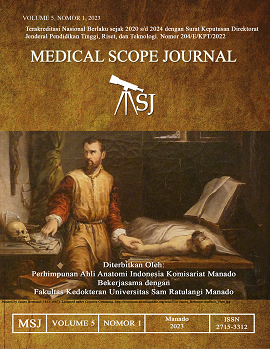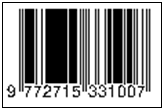Gambaran Self Compassion pada Mahasiswa Semester 7 Program Studi Pendidikan Dokter Fakultas Kedokteran Universitas Sam Ratulangi
DOI:
https://doi.org/10.35790/msj.v5i1.45281Abstract
Abstract: Medical school demands the medical students to be competent in their education, therefore, various academic responsibility can become a source of pressure or stressors for the students. Stress can be overcome when a person has self-kindness, common humanity, and mindfulness. These are the components of self-compassion. This study aimed to obtain the description of self-compassion among students of seventh semester (final semester), Faculty of Medicine of Sam Ratulangi University. This was a descriptive and quantitative study. Samples were taken using purposive sampling technique and 132 respondents were involved in this study. Questionnaires on Indonesian adaptation of the Self Compassion Scale questionnaire with the Likert model were distributed to the respondents. The results showed that based on the level of self-compassion, 92 students (70%) had moderate level of self-compassion, 36 students (27%) had high level of self-compassion, and four students (3%) had low level of self-compassion. Common humanity aspect was in the high category. Self-kindness, self-judgment, isolation, mindfulness, and over-identification aspects were in the moderate category. In conclusion, the average level of self-compassion in students of seventh semester, Faculty of Medicine of Sam Ratulangi University are at moderate level.
Keywords: self compassion; final year medical students; academic responsibility; stress
Abstrak: Jurusan kedokteran menuntut mahasiswa kedokteran agar kompeten dalam pendidikannya sehingga berbagai tuntutan akademik dapat menjadi sumber tekanan atau stresor bagi mahasiswa. Stresor dapat dihadapi ketika seseorang mempunyai self-kindness, common humanity, dan mindfulness. Ketiga hal tersebut merupakan aspek dari self compassion. Penelitian bertujuan untuk mengetahui gambaran self compassion pada mahasiswa semester 7 (semester akhir) Program Studi Pendidikan Dokter Fakultas Kedokteran Universitas Sam Ratulangi. Penelitian menggunakan metode kuantitatif deskriptif dengan membagikan kuesioner Skala Welas Diri (SWD) adaptasi Bahasa Indonesia dari Self Compassion Scale (SCS) model Likert. Sampel diambil dengan teknik purposive sampling dan terkumpul sebanyak 132 responden. Hasil penelitian memperlihatkan bahwa sebanyak 92 responden (70%) memiliki tingkat self compassion sedang, 36 responden (27%) memiliki tingkat self compassion tinggi, dan empat responden (3%) memiliki tingkat self compassion rendah. Aspek kemanusiaan universal berada dalam kategori tinggi. Aspek mengasihi diri, menghakimi diri, isolasi, kewawasan, dan overidentifikasi berada dalam kategori sedang. Simpulan penelitian ini ialah rerata tingkat self compassion pada mahasiswa Semester 7 Program Studi Pendidikan Dokter Fakultas Kedokteran Universitas Sam Ratulangi berada pada tingkat sedang.
Kata kunci: self compassion; mahasiswa kedokteran semester akhir; tuntutan akademik; stres
References
Christyanti D, Mustami’ah D, Sulistiani W. Hubungan antara penyesuaian diri terhadap tuntutan akademik dengan kecenderungan stres pada mahasiswa Fakultas Kedokteran Universitas Hang Tuah Surabaya. INSAN. 2010;12(3):153–4.
Melaku L, Bulcha G, Worku D. Stress, anxiety, and depression among medical undergraduate students and their coping strategies. Educ Res Int. 2021;2021. Doi: https://doi.org/10.1155/2021/9880309
Modi K, Dinesh K. Anxiety and depression in medical students and its association with coping method adopted by them. IJRRMS. 2013;3(2)L20-2.
Sari AN, Oktarlina ZR, Septa T. Masalah kesehatan jiwa pada mahasiswa kedokteran. Medula. 2017;7(4):82-6.
Neff KD. The Science of self-compassion. In: Compassion and Wisdom in Psychotherapy [Internet]. New York: Guilford Press; 2012 [cited 2022 Oct 14]. p. 79–92. Available from: https://self-compassion.org/wp-content/uploads/publications/SC-Germer-Chapter.pdf
Neff KD. The Self-Compassion Scale is a Valid and Theoretically Coherent Measure of Self-Compassion. Mindfulness (NY). 2016;7(1):264–74.
Amaranggani AP, Prana TT, Arsari NMCD, Surbakti AM, Rahmandani A. Self-compassion dan negative emotional states pada mahasiswa kedokteran umum: hubungan dan prevalensi. Journal An-Nafs. 2021;6(2):215–30.
Barnard LK, Curry JF. Self-compassion: conceptualizations, correlates, & interventions. Review of General Psychology. 2011;15(4):289–303.
Krieger T, Altenstein D, Baettig I, Doerig N, Holtforth MG. Self-compassion in depression: associations with depressive symptoms, rumination, and avoidance in depressed outpatients. Behav Ther. 2013;44(3):501–13.
Terry ML, Leary MR. Self-compassion, self-regulation, and health. Self and Identity. 2011;10(3):352–62.
Kim JJ, Doty JR, Cunnington R, Kirby JN. Does self-reassurance reduce neural and self-report reactivity to negative life events? Front Psychol. 2021;12:658118. Doi: 10.3389/fpsyg.2021.658118.
Sugianto D, Suwartono C, Sutanto S. Reliabilitas dan validitas self-compassion scale versi bahasa Indonesia. Ulayat. 2020;7(2):2580–1228. Doi: 10.24854/jpu02020-337
Neff KD. The development and validation of a scale to measure self-compassion. Self and Identity. 2003;2(3):223–50.
Neff K. Take the self-compassion test [Internet]. 2021. Available from: https://self-compassion.org/self-compassion-test/
Zulfa NA, Prastuti E. ‘Welas Asih Diri’ dan ‘Bertumbuh’: Hubungan self-compassion dan flourishing pada mahasiswa. Mediapsi [Internet]. 2020;6(1):71–8. Available from: https://mediapsi.ub.ac.id/ index.php/mediapsi/article/view/244
Setiani IB. Self-compassion mahasiswa tingkat akhir Prodi Bimbingan dan Konseling pada masa pandemi Covid-19. Prophetic [Internet]. 2021;4(1):1–8. Available from: http://syekhnurjati.ac.id/jurnal/ index.php/ prophetic
Rahayu AT, Ediati A. Self-compassion dan resiliensi pada mahasiswa di era adaptasi kehidupan baru. Jurnal Empati. 2021;10(5):362–7.
Prabawa FA. Psychological well-being dan self-compassion mahasiswa di Mahad IAIN Salatiga. Indonesian Journal of Guidance and Counseling: Theory and Application (IJGC). 2022;11(1):70-9. Available from: http://journal.unnes.ac.id/sju/index.php/jbk
Downloads
Published
How to Cite
Issue
Section
License
Copyright (c) 2023 Virene L. Nayoan, Lydia E. V. David, Jehosua S. V. Sinolungan

This work is licensed under a Creative Commons Attribution-NonCommercial 4.0 International License.
COPYRIGHT
Authors who publish with this journal agree to the following terms:
Authors hold their copyright and grant this journal the privilege of first publication, with the work simultaneously licensed under a Creative Commons Attribution License that permits others to impart the work with an acknowledgment of the work's origin and initial publication by this journal.
Authors can enter into separate or additional contractual arrangements for the non-exclusive distribution of the journal's published version of the work (for example, post it to an institutional repository or publish it in a book), with an acknowledgment of its underlying publication in this journal.
Authors are permitted and encouraged to post their work online (for example, in institutional repositories or on their website) as it can lead to productive exchanges, as well as earlier and greater citation of the published work (See The Effect of Open Access).










